HEALTH HAZARD
Boil-before-drinking notice remains for Makhanda’s contaminated water
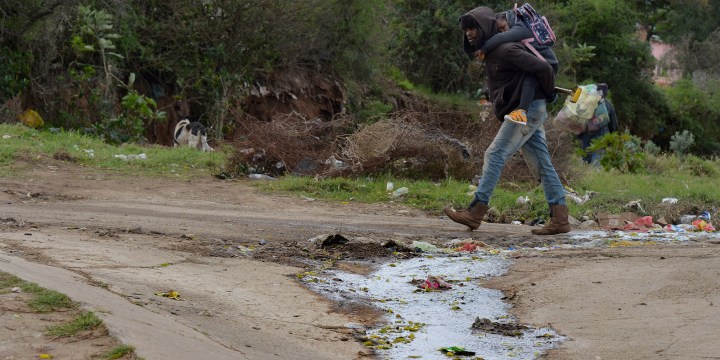
A boil-before-drinking notice for Makhanda and surrounding towns’ water will remain in place after the Makana Local Municipality admitted that there was widespread E. coli contamination. This will require an extensive clean-up, especially as the working theory is that the town’s drinking water was being contaminated by polluted groundwater.
Rhodes University and the Department of Water Affairs have stepped in to assist the Makana Local Municipality after E. coli bacteria were found in its water.
Experts believe the town’s water supply was contaminated by groundwater. There have been several pipe bursts due to extreme water restrictions as the town battles technical failures that hamper supply. Nighttime water restrictions are also in place.
The presence of E. coli bacteria means that the water had been contaminated with faecal matter.
With frequent water outages in Makhanda, at the moment caused by mechanical problems, the sewage system is blocking up and on Friday, 9 June several spills could be seen.
In the informal settlements, residents complained that the truck collecting waste from bucket toilets had not arrived. Residents said they were emptying the contents of the buckets into a nearby stream. Desperate residents are also constructing a toilet on the banks of a stream in town.
Residents said they have to buy drinking water now at a cost of R7 for five litres.
“The City of Saints has been turned into a City of Shame,” River Rescue coordinator Helen Holleman said.
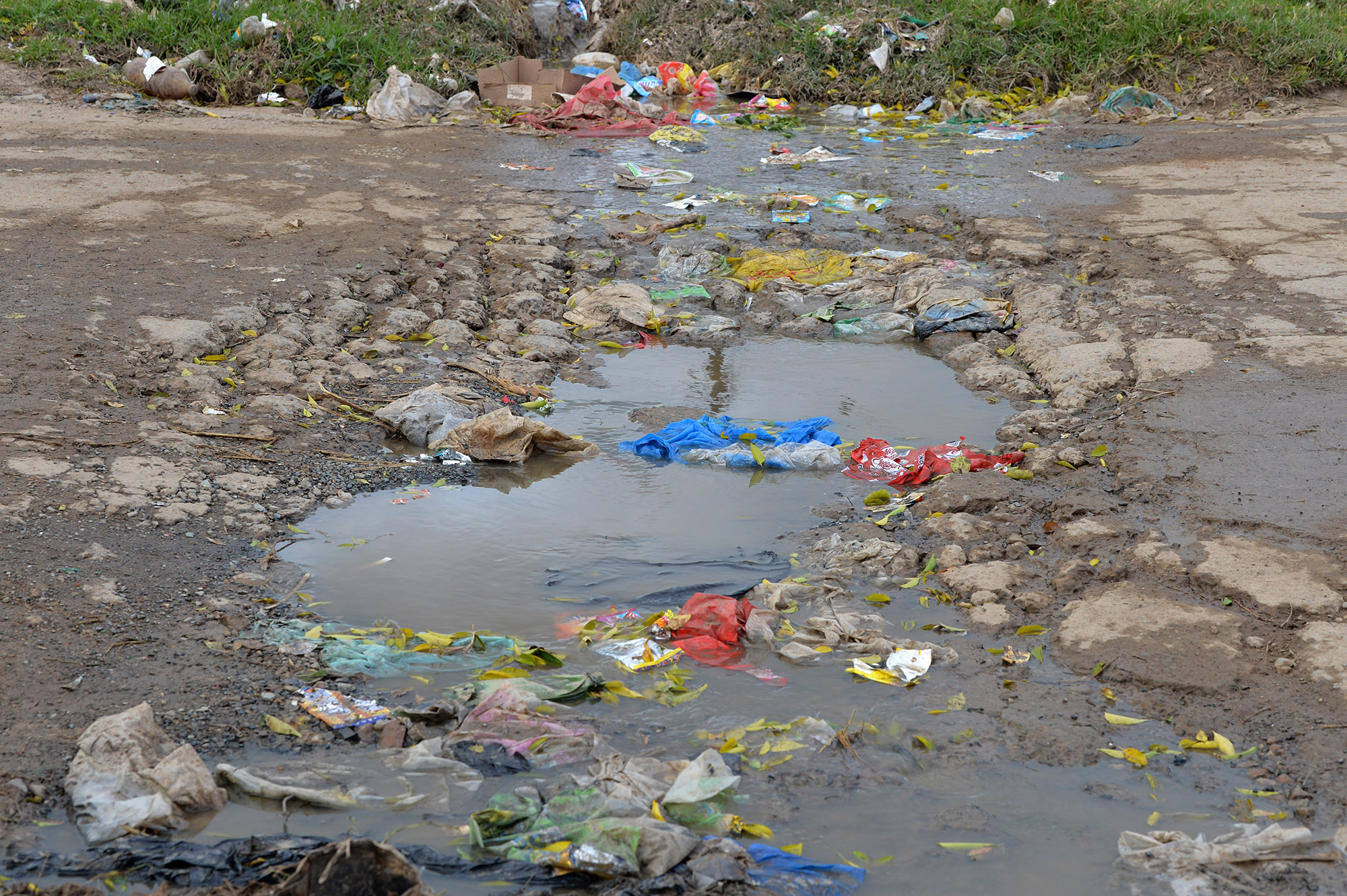
A sewage spill in Makhanda where people collect water. (Photo: Deon Ferreira)
She said the town’s water security was endangered by constant sewage spills, illegal waste dumps and the continued and badly managed use of the bucket system. She said that because of frequent water outages in the town, people were desperate and would drink water from the rivers, which have been polluted with things like soiled nappies and dead dogs.
“It is an extremely dangerous thing to do,” she said. “We haven’t seen a water quality report in forever. I have personally never seen one.
“Honestly, not even the SPCA would allow their animals to live like this. Where is the love and care for our people?”
“Our ditches are full of sewage. I have been saying, ‘Why were you all so worried about Covid-19? Instead, in this town, you should be worried about cholera, typhoid and brucellosis because people have to share water with cows.’ ”
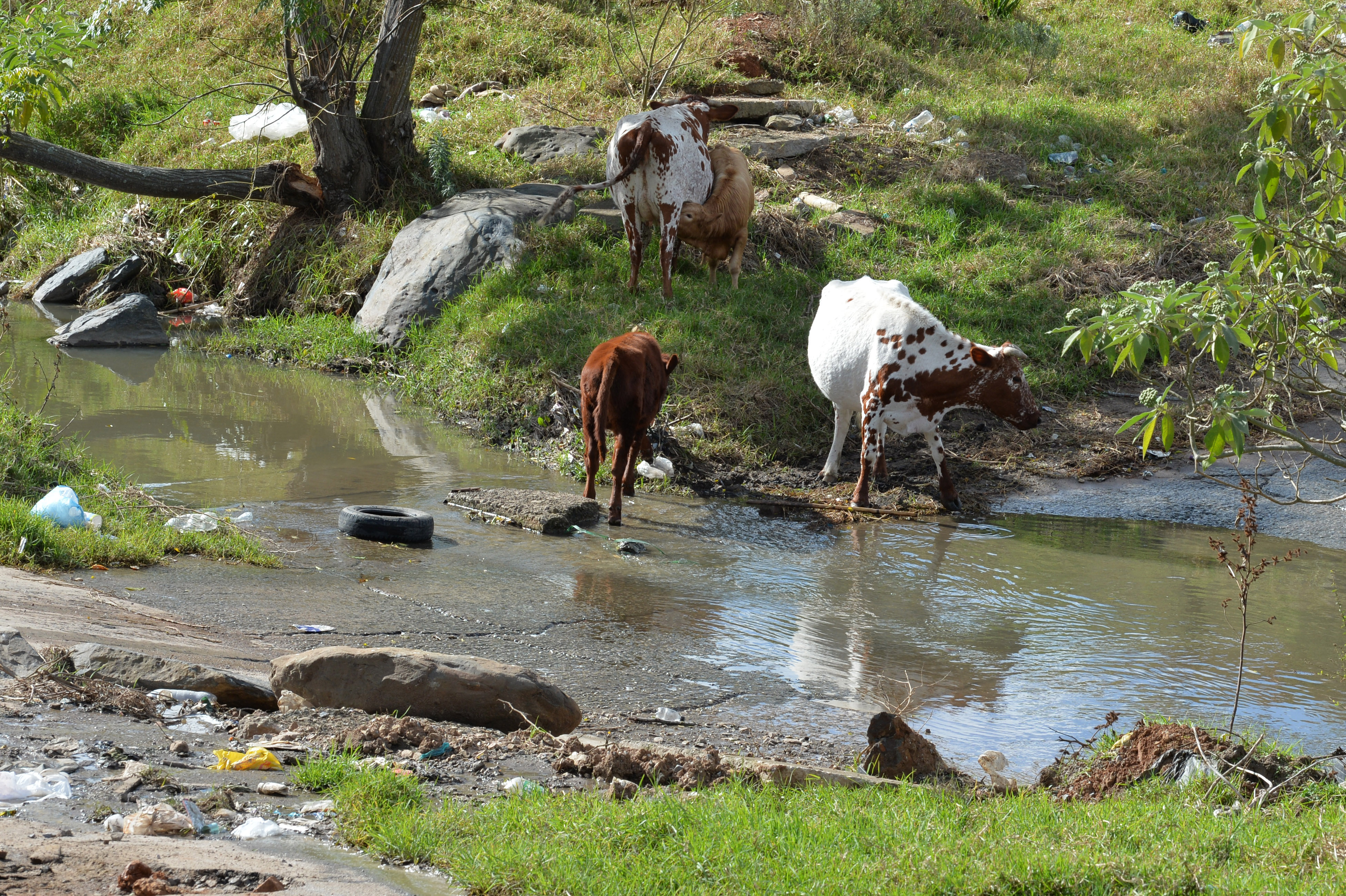
‘In this town, you should be worried about cholera, typhoid and brucellosis because people have to share water with cows,’ said River Rescue coordinator Helen Holleman. (Photo: Deon Ferreira)
Holleman said because the municipality was restricting water at the reservoir level there were frequent pipe bursts. “There is often more water in the street than in the taps.”
She said there had been cases of dysentery and frequent reports of people with upset stomachs.
“The water quality is dubious at best and coupled with that, toilets cannot be flushed because of frequent water outages,” she said. “If you don’t have a JoJo tank in this town you are in big trouble.”
Councillor Kungeka Mashiane said there were five schools in Ward 2 where children’s learning time was severely restricted because, for the past week, there had been no water.
‘Pipes are bursting everywhere’
“Water is a huge problem,” she said. “We wash ourselves in buckets and then we use the water to flush the toilet. Pipes are bursting everywhere.”
In Fingo Village informal settlement, the communal taps have been dry for a long time The bucket system is still in place, but the truck no longer comes to collect the waste, forcing residents to empty the contents into rivers.
“This is the same place where children come to swim,” said community leader Lungile Mxube.
“The air was fresh here when we came here,” Eric Mbilini (59) said. Now the stench of sewage hangs in the air despite the cold wind blowing.
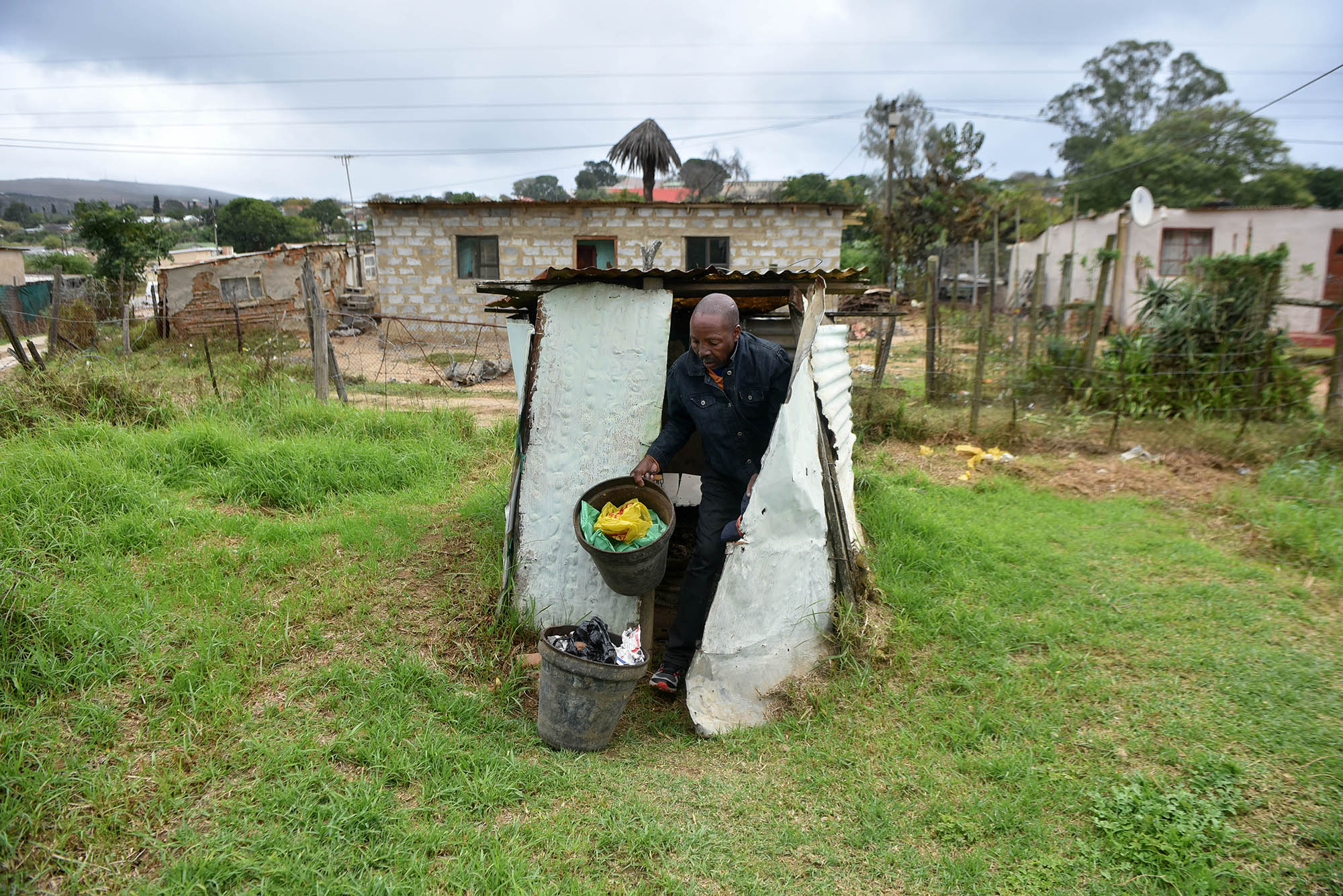
Eric Mbilini gets ready to empty his bucket toilet into a nearby stream. (Photo: Deon Ferreira)
“Now I struggle with my asthma every day. I have lived here for 10 years. Everyone has been here promising us toilets and still, we have the buckets. There are about 100 of us living here. We put the buckets in the river every day. What choice do we have? They never come to fetch it.”
He said the only good thing about the water outages was that the sewage spill that often runs past his house had dried to a trickle.
Read more in Daily Maverick: ‘How are we going to survive without water?’ — Makhanda residents and Rhodes students up in arms
Sahkiwo Moeldoh has 11 people, including children, living in his house. They are now building a long-drop toilet on the banks of the stream.
“We are tired of the buckets,” he said. “We are now making another plan. I have no other option. We are covering the hole [so] that the children won’t fall in. Tell the minister to come here [so] that we can show him how we live.”
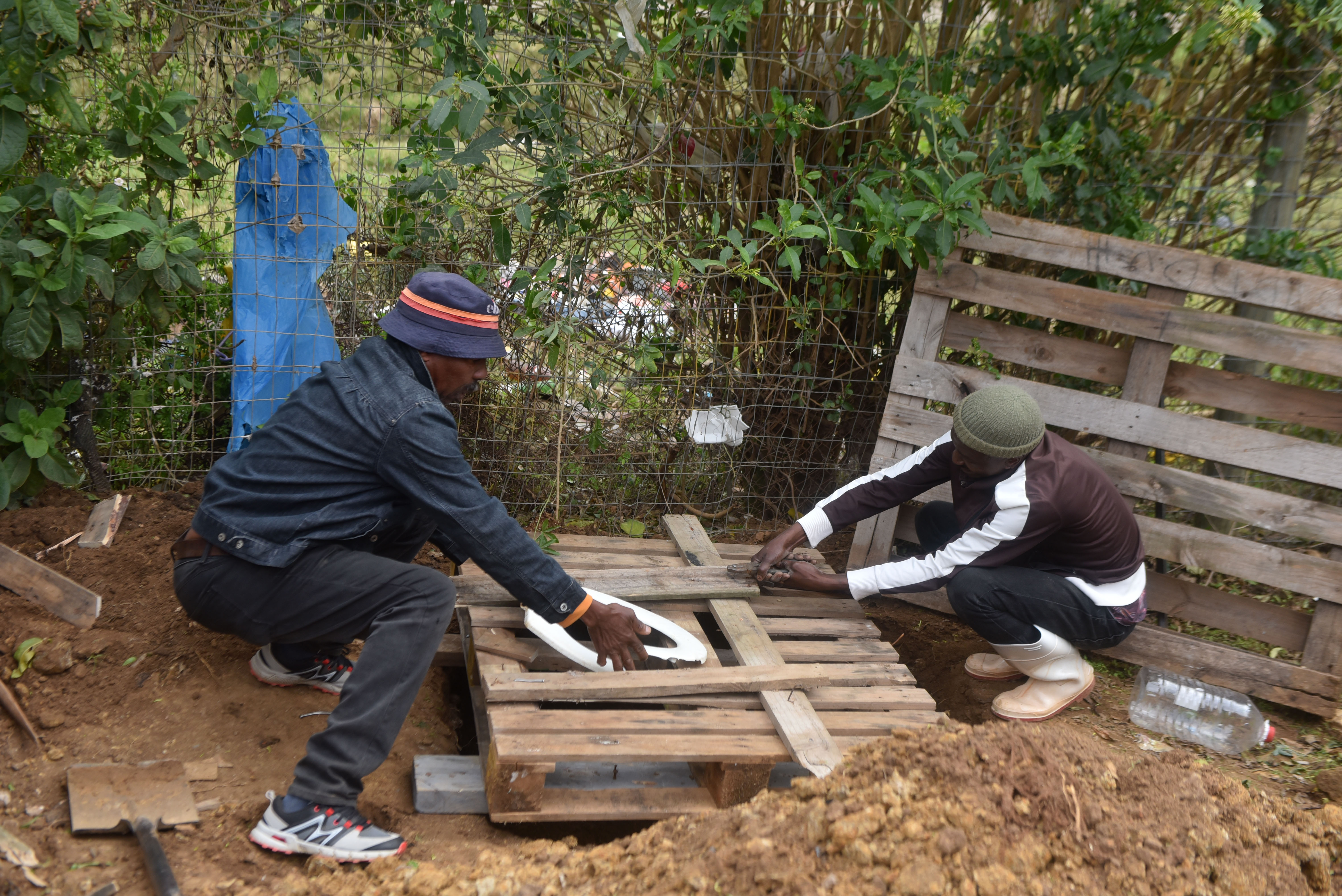
Sahkiwo Moeldoh builds a long drop toilet on the edge of a stream in Makhanda. (Photo: Deon Ferreira)
In a statement issued on Friday, the municipality said: “The presence of faecal contamination requires prompt disinfection for deactivation of bacteria as well as follow-up testing to ensure that disinfection is effective.”
The latest Blue Drop Watch Report compiled for the Department of Water and Sanitation stated that the municipality had run out of chlorine gas, of which there is a national shortage and had been using HTH to treat the town’s water supply.
Read more in Daily Maverick: Critical but stable – SA’s water quality and infrastructure rated
The Makana Local Municipality includes Makhanda, Alicedale, Riebeeck East, Fort Beaufort, Salem, Seven Fountains and Sidbury.
“Makana Municipality, in partnership with Rhodes University, has been conducting follow-up water quality tests over the past week at several different sites. Amatola Water and the District Environment Health Department have also been taking samples from various sampling points to assist with more data collection in order to fast-track the identification of the cause of failures,” said the municipality.
According to this statement, the municipality has increased its chlorine dosing at the treatment works and the reservoirs over the past few weeks.
It said following this approach, the E. coli levels at certain sites had decreased.
According to the municipality, test results showed that there was no E. coli in the water exiting the water treatment works.
“It is believed that the current hotspots where E. coli is still present may be associated with contamination from groundwater as the water travels from the reservoirs to the water usage points. This indicates that some areas may still have ongoing issues with microbiological contamination, especially while water supply continues to be supplied on alternate days,” the statement continued.
High E. coli counts were measured in tap water samples taken at the military base, police station, the environmental health offices, Raglan Road Clinic, the indoor sports centre and a tap in Extension HH.
A significant health risk
The tap water in town is only 64% compliant with national standards, according to the Blue Drop Watch.
“Non-compliance with microbial standard held a significant risk for community health,” the report continued.
The World Health Organization and South African National Standard’s (Sanas’s) standard requirement when testing 100ml of water for E. coli in drinking water is that it “must not be detectable”.
Since the Blue Drop Watch Report was issued, the municipality’s compliance dropped from 68% to 64%.
Rhodes University’s Biotechnology Innovation Centre (Rubic) made its laboratories available to the municipality to test the water and provide monitoring of disinfection measures.
“Dr Nhamo Mutingwende, a post-doctoral researcher at Rubic, supported by a PhD student, Siphumze Bani, and two MSc students, Shannon Rutherford and Tasmita Singh, worked late nights and weekends to sample water across Makhanda,” said the university.
“Rubic administrator Lwazikazi Madikiza has managed the sample collection and testing logistics, which has included vehicle hire and ordering additional laboratory supplies and reagents.
“The Rubic Water Testing Laboratory’s testing is dependent on ‘water-on’ days, so samples have been collected over three-day intervals, which includes testing conducted at different water reservoirs.
“The staff of Rubic’s Water Testing Laboratory, headed by Professor Janice Limson and Dr Ronen Fogel, have primarily conducted microbiological testing, measuring total coliforms and the bacteria Escherichia coli.
“The most recent microbiological testing conducted by the Rubic Water Testing Laboratory shows that out of 11 sites sampled, four sites showed the presence of E. coli,” Limson, the director of Rubic, said.
The laboratory was launched this year to support community water testing for bacterial contamination, among other water quality indicators.
“Rubic’s water testing will not replace the Sanas-accredited testing done by the Makana Municipality but aims to supplement their efforts,” Limson added.
The DWS has also launched a campaign in Makhanda communities to raise awareness about the impact of water pollution and waterborne diseases.
It noted that E. coli had been found in water samples at detection points, but had not been detected in local water treatment works.
“The Department confirmed that as at 27 May 2023, no E. coli was detected from the James Kleynhans Water Treatment Works which treats water for communities in Makhanda and surrounding areas.”
The department said that the municipality had managed to procure chlorine gas in the meantime.
The Makana Local Municipality has not yet responded to questions about how long the clean-up of the system will take. DM






















 Become an Insider
Become an Insider
Comments - Please login in order to comment.